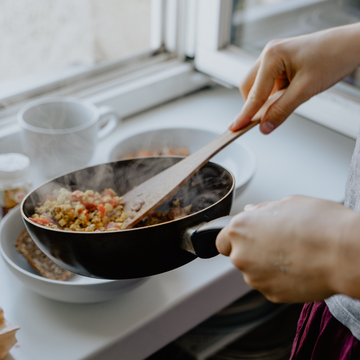Now is as a good of time as ever to consider your health and wellbeing. The current situation may find you reaching for a solution to eat better or researching how you can look after yourself and your family members during this time. We have done the research for you to help with starting, maintaining or improving your health journey through this time.
Eat a Balanced Diet
Eating a variety of fruits, vegetables, wholegrains, legumes, meat and dairy products is essential for weight regulation. It will provide a nutrient dense source of energy that ensures you receive all the vitamins and minerals needed for optimal function.
Increase Fibre Intake
All plant-based foods offer an abundance of both soluble and insoluble fibre, which are important for gut health and help keep you feeling satiated and full.
Get Cooking
Now is a great time to get creative in the kitchen. Why not buy that cookbook you’ve always wanted or try a new recipe, or even create your own! The more you try and enjoy the process of cooking and eating, the more likely you are to stick to your healthy habits in the long-term.
Limit Processed Foods
Processed and pre-packaged foods are often high in ‘empty’ calories, or calories that offer little nutritional value and will not leave you feeling full. These foods are usually high in sugar, sodium and saturated fat. Whilst needed by the body in small amounts, excess intakes of these nutrients can increase the risk of weight gain and thus, chronic disease.
Limit Alcohol Intake
While the occasional drink can be central to the way we socialise and relax, alcohol is high in calories, and when consumed in excess, can make it difficult to maintain your current weight. The metabolism of alcohol can also interfere with the metabolism of important nutrients, so if you want to make the most of your food, consider reducing your alcohol intake.
Sleep
The average adult needs 7-8 hours of sleep every night, and some may even need up to 9 hours. Sleep deprivation can increase our hunger hormones and appetite, which may lead to overeating.
Stay Hydrated
Drinking enough water can be a struggle for many. We recommend topping up a water bottle in the morning and sipping throughout the day.
If you don’t want to leave for the supermarket during this time you can organise safe home delivery of hygienically pre-prepared meals. Be Fit Food can help you here, we provide snap -fresh frozen, family friendly, portion controlled, low carbohydrate, high protein meals, with no added sugar or preservatives. We also offer a range of family friendly snacks, including protein balls, healthy dim sims and cookies!
This information is a general guide only, if you require individualised dietary advice we recommend speaking to an Accredited Practising Dietitian. You can also contact the Dietitian at Be Fit Food by emailing dietitian@befitfood.com.au for more information. Speak to your health care provider before changing your diet.









